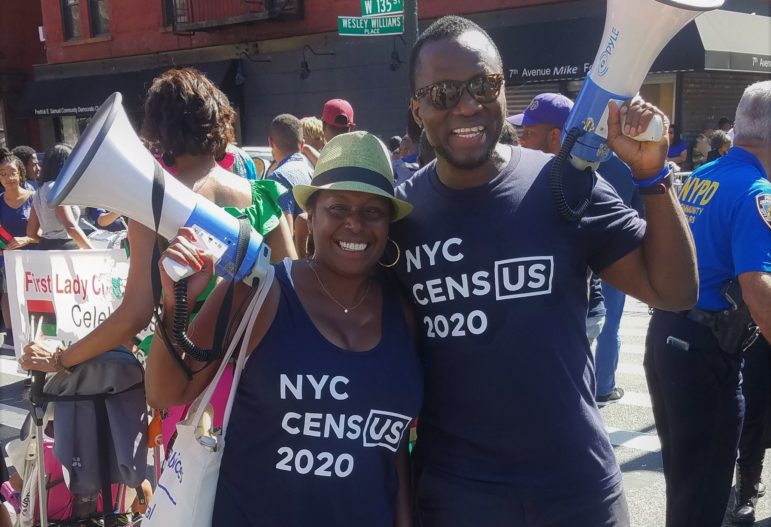
City of New York
Image from the city’s Census 2020 website.This article appeared in Spanish first.
Lee la versión en español
More than half of U.S. citizens of Latino descent believe that the 2020 Census includes a question about citizenship, a mistaken belief whose apparent popularity deeply troubles advocates and officials.
Since the citizenship question was left out of the 2020 Census, many have questioned what the consequences would be among Latinos. On February 10, the National Association of Latino Elected and Appointed Officials (NALEO) released the results of a national survey conducted between October 8 and October 19, 2019, months after the decision not to include the citizenship question in the Census.
Overall, 48 percent of Latinos surveyed expected to see a citizenship question on the census. Latinos who are citizens (naturalized and U.S. born) were more likely to believe the questions was part of the Census, 53 percent. In contrast, only 40 percent of non-citizens believe the question is part of the census.
As Arturo Vargas, Chief Executive Officer of NALEO, pointed out during the press conference, this is “an incongruous finding” because it shows that those who are not citizens are “better informed.” That’s why Vargas asked the English-language media to be as attentive to the problem of Census misconceptions as the Spanish-language media.
It is, however, also worrying that 42 percent of undocumented immigrants still believe the question is part of the Census.
The study also highlighted “high levels of anxiety within Latino community around the 2020 Census.” This is reflected in the fact that while 77 percent of Latinos understand that their community would benefit if they participated in the Census, at the same time, 75 percent of the respondents had major concerns that their personal information would be uses against them by the Trump’s administration
To add to this concern, 78 percent of respondents think the Census website is vulnerable to online interference. Moreover, according to the press release, “there are widespread misconceptions around what will be asked, and what the Census does with the information”.
As Julie Menin, New York City 2020 Census director, explained, the Census is essential for everyone because it allocates “the share of public funds.” For New York, this means millions of dollars for programs such as housing, health, education, transportation, as well as political representation and “more than 300 programs in the city,” says Menin. Due to the undercount in 2010, “we lost millions of dollars,” she says.
In addition to its public importance, the Census has political significance: The results can increase or decrease the number of legislative representatives in the city. New York’s population dropped by an estimated 76,790 people between 2018 and 2019; thus New York could lose two seats in Congress. It can also shift power in Congress, the state Assembly, State Senate and City Council among neighborhoods or between the city and its suburbs.
Additionally, the Census is important for defining the political representation of immigrant and non-White communities, which have been historically underrepresented. According to projections by the Urban Institute, “Black and Hispanic/Latinx-identified individuals in the high-risk scenario could be undercounted nationally by 3.68 percent and 3.57 percent, respectively.” Some 2.2 million Latinos around the United States could be miscounted. Immigrants are among the Census’ definition of hard-to-count populations. On the other hand, White people are the only group projected to be over-counted in certain states.
Surprisingly in New York, the self-response rate in the 2010 census was 77,4, slightly higher than the national rate 76 percent, in Washington Heights, a neighborhood with a large immigrant population. But the concern is that it will slip this year.
Another concern for Latinos is providing specific information about themselves or their family members. In addition, “nearly all shared the view that Latinos who are not citizens will not want to participate once they see the questions being asked,” reads the NALEO report. Also, 73 percent of “non-citizens are concerned that immigration enforcement agencies will use their census information against them or their families”.
This misunderstanding is more prominent among Latinos under 40. Just under half of them believe that the census is used to provide information to track and locate people by “immigration and law enforcement agencies,” while 29 percent of Latinos over 40 believe the same.
The fear among Latinos, and especially among undocumented immigrants, is not baseless. Shortly after the question about citizenship was rejected, President Donald Trump asked federal agencies to find a way to “gain a full, complete and accurate count of the non-citizen population.” As Reveal reported, “even without a citizenship question, the [Census] Bureau now can accurately identify whether a respondent is a citizen at least 90 percent of the time.”
With regards to the response options, Latinos preferred to participate by mail, especially non-citizens and Latinos over 40. In contrast, those Latinos under under 40 preferred online despite the fact that in the focus groups in 2019, most admitted not knowing how the online process worked.
The Census consists of nine simple questions, but one question about citizenship–which is not included–could end up costing several cities billions in aid, under-counting historically marginalized populations, and undermining research.








